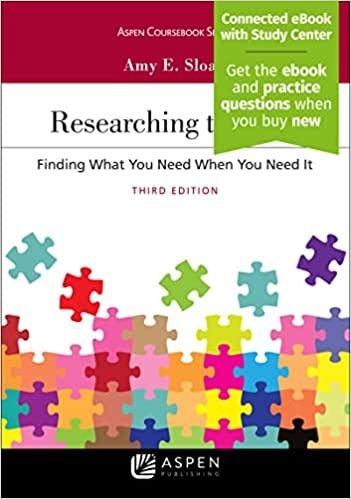Question
TORTS Torts. Funny name, but probably more familiar to you than you think. Other than criminal cases, torts cases are likely what most people envision
TORTS
Torts. Funny name, but probably more familiar to you than you think. Other than criminal cases, torts cases are likely what most people envision when thinking about jury trials: Car wreck cases.Medical malpractice cases. Products liability cases.All torts.
Personal injury cases are ones where one person (the plaintiff) has suffered a physical injury because of the alleged wrongful conduct of another person (the defendant) and has sued that defendant to recover damages (e.g., car wreck, slip and fall, medical malpractice). There are many things that jurors who hear and analyze facts in these cases don't know. Let's talk about it.
Note: Juror - individual; Jury - group of jurors.
These types of cases are handled by personal injury attorneys who are paid on a contingency basis as opposed to an hourly fee. This means the lawyer will get a percentage (usually somewhere between 33-40%) of whatever the ultimate award is. There are generally expenses and other items that need to be paid before calculating the attorney's fee, but still, pretty good deal if you can get a big verdict!Not every case ends with a big verdict though. Many do not. And, the cases you lose can really hurt because you and your client get ZERO. You might spend 3 years working very hard on a big case and wind up with nothing.
On the other side, the attorneys who defend these types of cases are usually lawyers that represent the interests ofand are paid for byinsurance companies. If you are in a car wreck and are sued by the other party, it will almost always be your insurance company who selects and pays for your lawyer and who pays for any judgment against you within your policy limits. Seems like, perhaps, relevant information for a jury to consider. Right? But, the lawyers won't (and can't) tell the jury about insurance coverage during these trials. Why?
Because, as the theory goes, people associate insurance companies with deep pockets.And the jury may think, "well, the defendant isn't really coming out of pocket for this . . . and the insurance company has lots of money . . . so let's give the plaintiff $5 million!!" Makes sense. If you disassociate the damages from the defendant and his or her conduct, you might tend to lose sense of reality and what is reasonable. Courts want to protect against this, especially if the facts do not warrant a big money verdict.
On the other hand, not telling juries that there is insurance coverage in a case might have the opposite effect. The jury, not knowing about the insurance company, may be very hesitant to award appropriate damages or any damages at all. The thinking is that jurors factor in whether a defendant can pay a significant amount even when the facts support such an award.
Question:So, defense lawyers don't want jurors to know about insurance coverage in these types of cases to prevent million-dollar verdicts. Plaintiff's lawyers, however, think you should know about insurance coverage so that you won't be dissuaded from awarding just damages. What do you think? We know that jurors almost always speculate about whether the defendant is covered by insurance. If they are already thinking about it, do you think they should know? Would you, as a hypothetical juror on big dollar personal injury case, want to know whether the defendant is covered by insurance and whether the insurance company will cover most, or all, of any damages awarded by the jury? Do you think it would change your outlook on the case?
141407
Step by Step Solution
There are 3 Steps involved in it
Step: 1

Get Instant Access to Expert-Tailored Solutions
See step-by-step solutions with expert insights and AI powered tools for academic success
Step: 2

Step: 3

Ace Your Homework with AI
Get the answers you need in no time with our AI-driven, step-by-step assistance
Get Started


